She had betrayed everything her father-in-law and husband had worked for for a quarter of a century. She secretly removed the coronation insignia from Poland and gave them to the joyful emperor of Germany. Thanks to her, Poland again fell to the rank of a principality. But was it really so?
There was a whole cavalcade of heavy carts in front of the gates of the palace in Poznań. Rycheza - the ruler of Poland, the favorite of Bolesław the Brave and the wife of his son Mieszko - has just issued one of the most important decisions in her life. She said she had enough. And she ordered everything that was of any value to be loaded onto the carts.
A treacherous German?
She took jewelry, valuables, relics, all personal trinkets, and maybe even furniture. She wrapped the books. Among them was the magnificent Egbert psalter, which she had received from her mother years ago. There was also the so-called Matilda's Codex. A priceless work with the first portrait of the ruler in the history of the Piast dynasty. Finally, Rycheza also packed… Polish history.
One of the carts landed a court yearbook, which recorded the most important events from the entire golden age of the Piast empire. Most of all, however, the queen took the crowns. Not only her own, but also the one that her father-in-law and spouse were crowned with. And she took them nowhere else, but straight to the German court.
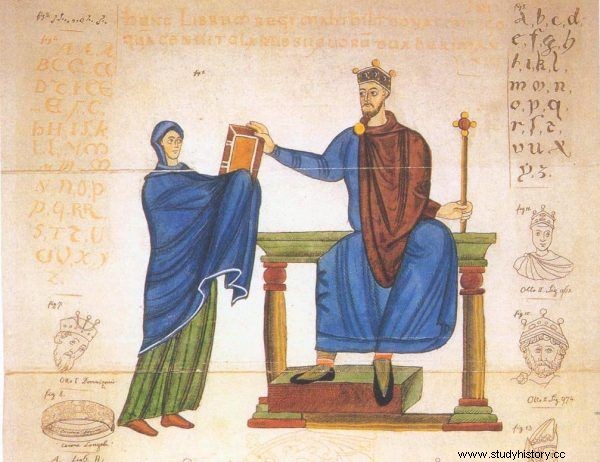
Image of Mieszko II from Codex Matilda (source:public domain).
The circumstances of Riches' departure, which took place in the late fall of 1031, did not reach the general awareness. Apart from a handful of historians, almost no one remembers what events drove the Queen to make a fateful decision.
Why did she leave the country where she spent almost two decades of her life? Why did she deprive her husband of the most important symbol of his power? And why did she strip the Poznań palace? In novels, textbooks and popular biographies, one cannot find answers to the questions posed. Only the burning belief remained that Rycheza had betrayed.
For an average Pole, the daughter-in-law of Bolesław Chrobry is a bad German woman who sold the Piast state to Swabom. She reproaches her for the open and brazen looting of the most important Piast valuables. It is written that Rycheza left for Germany and immediately bowed to the local ruler, Conrad II. She gave him her crowns and renounced her royal title… on behalf of her husband! This act was judged with complete severity.
The eminent medievalist, Gerard Labuda, emphasized that the ruler had selfishly put her interests ahead of the good of her adopted motherland . Kazimierz Jasiński also attributed the behavior of Mieszko II to the wife of Mieszko II that was contrary to the Polish raison d'état. And this is only the most courteous and professional of the opinions expressed about Rycheza.
Equal to targowiczans?
For hundreds of years, she was considered one of the darkest characters in Polish history. She was seen as a greedy, treacherous and violent woman. She was accused of having plunged her husband and undermining her son's position. Her character was mentioned in the same breath with the marketers, Katarzyna the Great, Henryk Walezym.
With each century, hatred only grew. Chroniclers and historians have memorized Ryksa for generations' curses - Count Aleksander Przezdziecki, a reliable hunter of Piast heritage, stated in the mid-nineteenth century. In his opinion, the children did not have pity for the queen either. Already several-year-old children spoke with disgust the "hateful name" of Rycheza. But is it right?
The most underrated figure in Polish history?
In the history of the Polish Middle Ages, and perhaps even throughout Polish history, it is difficult to find a more underrated figure. The events that determined her era have given rise to countless national myths. The 1000th Gniezno Congress, the extraordinary friendship of the Polish ruler with the imperial boy Otto III, the royal coronation of Bolesław the Brave ...
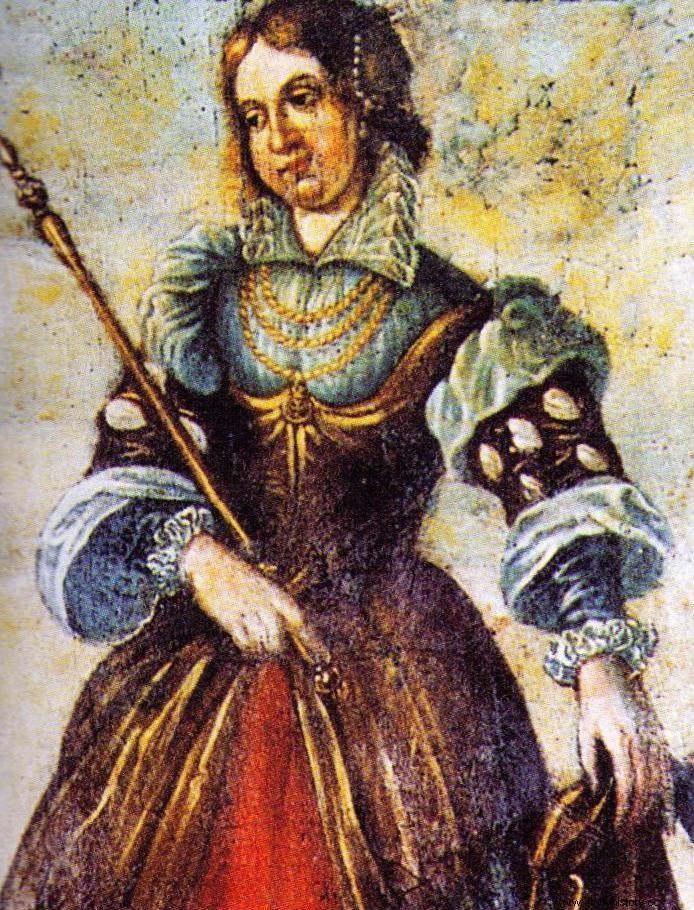
Has Rycheza really deserved all the insults that have been thrown at her over the centuries? The illustration shows a fragment of an early modern painting from Brauweiler (source:public domain).
Everything seems to be correct. Rycheza left Poland. She took the crowns and paid tribute to the emperor. Thanks to her, Mieszko II turned from a king into an ordinary prince. However, Rycheza did not plunge Poland at all. Come on soon - she saved her. Not the first time and not the last.
These crucial facts do not need to be presented to anyone. It is worth emphasizing, however, that they were not frames from a history dominated only by men. In these events, Rycheza played an equally important role as Bolesław and Otton. Without it, nothing would have happened.
At the turn of the 10th and 11th centuries, the idea of a royal title was just taking shape. In the opinion of the European elite, it was impossible to become a king. You had to be born with it. It was believed that only a man sanctified by imperial blood could be anointed and coronated. And it is imperial in a very narrow sense. A bond with Charlemagne was necessary.
All German, Burgundian and French monarchs considered themselves descendants of this great leader. If Bolesław the Brave wanted to join them, he also had to make a tangible connection with Karol. He was not his heir, but could still become his kinsman. This is what he concentrated his efforts on.
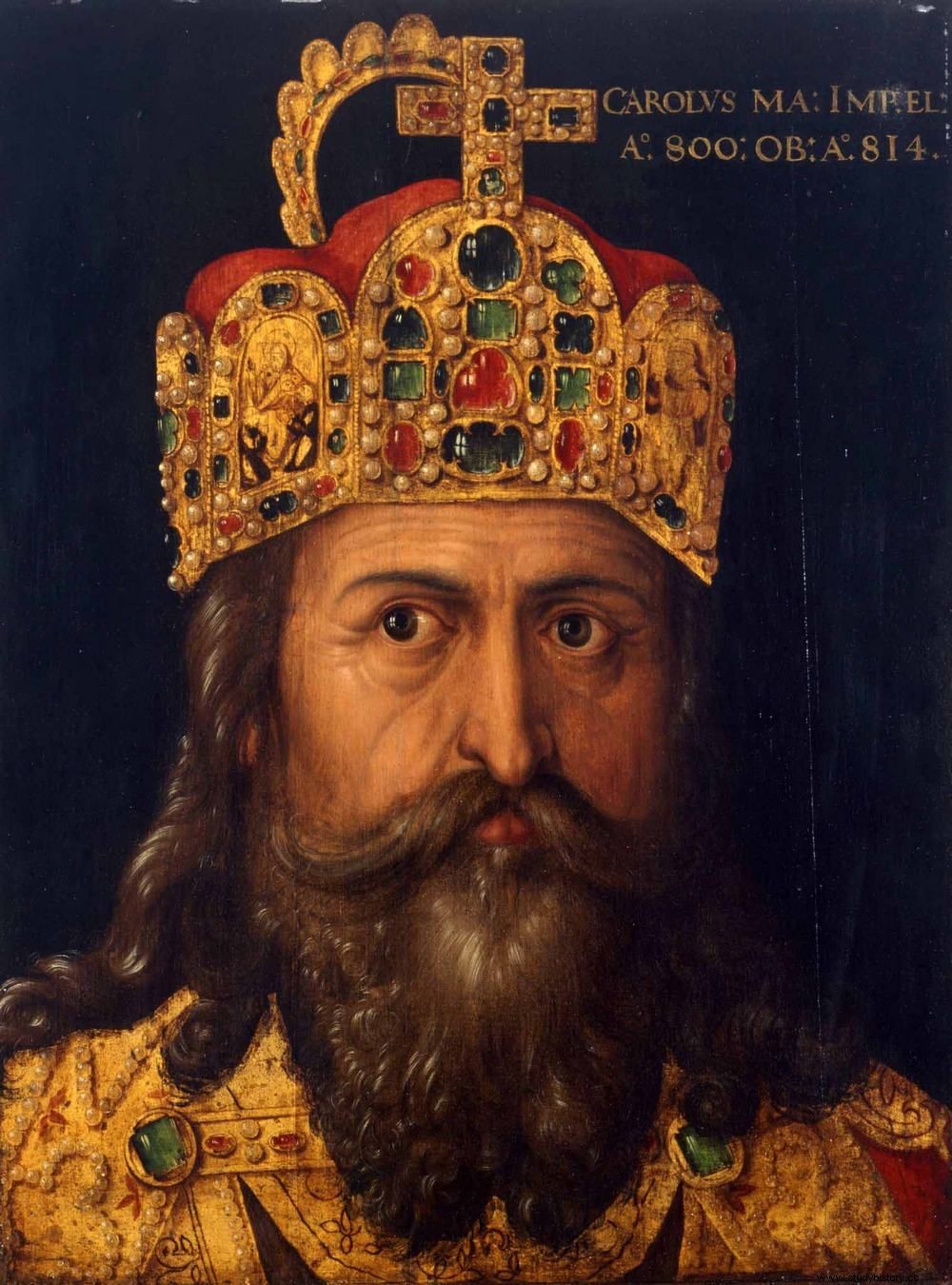
At the turn of the 10th and 11th centuries, it was believed that only those with the blood of Charlemagne flowing in their veins could claim to be kings (source:public domain).
Everything indicates that in the year 1000 there was not only a great feast and a political demonstration, but also a memorable engagement. Otto III undertook to marry his niece to one of the sons of Bolesław the Brave. And that niece was precisely Rycheza.
The woman who crowned Poland
The future ruler was less than five years old. Perhaps it was her age that prevented a full-fledged Polish coronation from taking place in Gniezno. We had to wait for the girl to grow up and formally bond with a representative of the Piast dynasty. Only then was it possible to think about crowning Bolesław's temple with a royal diadem.
The situation changed dramatically when Otto III died, and the new German ruler began to confront his Slavic neighbor. The idea of a coronation, however, did not go away. And the plan for the political promotion of Brave was invariably associated with the figure of Rycheza.
In 1013, there was finally a wedding between the imperial niece and the Polish prince Mieszko II. At that time, it was said openly about restoring the provisions of Gniezno to power. Attempts were made for the coronation, although the constantly changing political landscape stubbornly prevented it. Chrobry did not proclaim himself king until 1025. He died a few weeks later, so it can be assumed that he was not the driving force behind the new campaign to create a Polish monarchy.
Someone else won the crown for the old chief. And it seems almost certain that it was Richeza. It was she who negotiated the necessary compromise with the new German ruler. She also became a living link between Charlemagne and the Piast dynasty. In the spring of 1025, Bolesław the Brave and Mieszko II were crowned. Above all, however, Riches was crowned then:the first Polish queen.
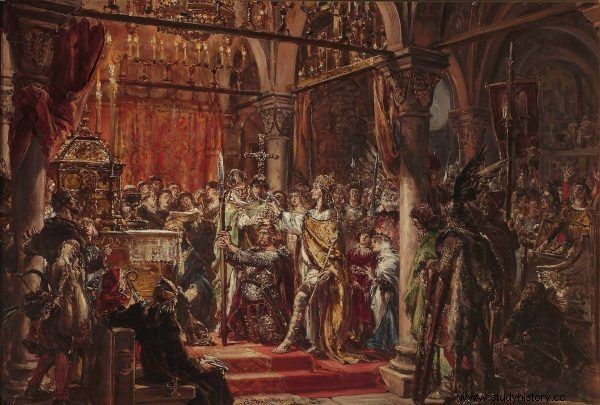
If not for Rycheza, Chrobry would probably never have become king. The illustration shows a painting by Jan Matejko showing the first Polish coronation (source:public domain).
The ruler seemed to be hoping that the anointing would become a shield that would shield the state and the ruling house from the chaos accompanying the change of the throne. She was painfully mistaken. After a quarter of a century full of wars and destruction, the Piast country was just a colossus on earthen legs. Now this mighty statue began to bend under its own weight. The peasants were agitated, the treasury was empty, and the three sons of the king threw themselves at each other's throats, without even waiting for Bolesław's corpse to cool down.
And brother turned against brother
Apart from Mieszko II, appointed to power over the brothers, Bezprym and Otton also dreamed about the crown. They started a conspiracy that led to the first partition of Poland in history. The Germans hit the country from the west. The eastern border was crossed by the ranks of Rus and Vikings. The country, torn apart by enemies, was on the brink of collapse, and its ruler was forced to flee abroad. He ended up in Bohemia, where he was imprisoned and castrated, to the delight of the local prince.
All this happened in 1031, and Riches was by no means a passive observer. Using her contacts in Germany, she did everything to stop the imperial offensive against Poland. Thanks to her, the ruler of the Reich turned back without a single significant battle.
The ruler, however, had no similar influence on the prince of Kievan Rus and on her brother-in-law Bezprym. Viking hordes swept through the land of the Piasts, nowhere meeting any dense resistance. The dust of the war did not even fall, and Rycheza found herself in a completely new and strange situation. She was still queen. Only without a kingdom.
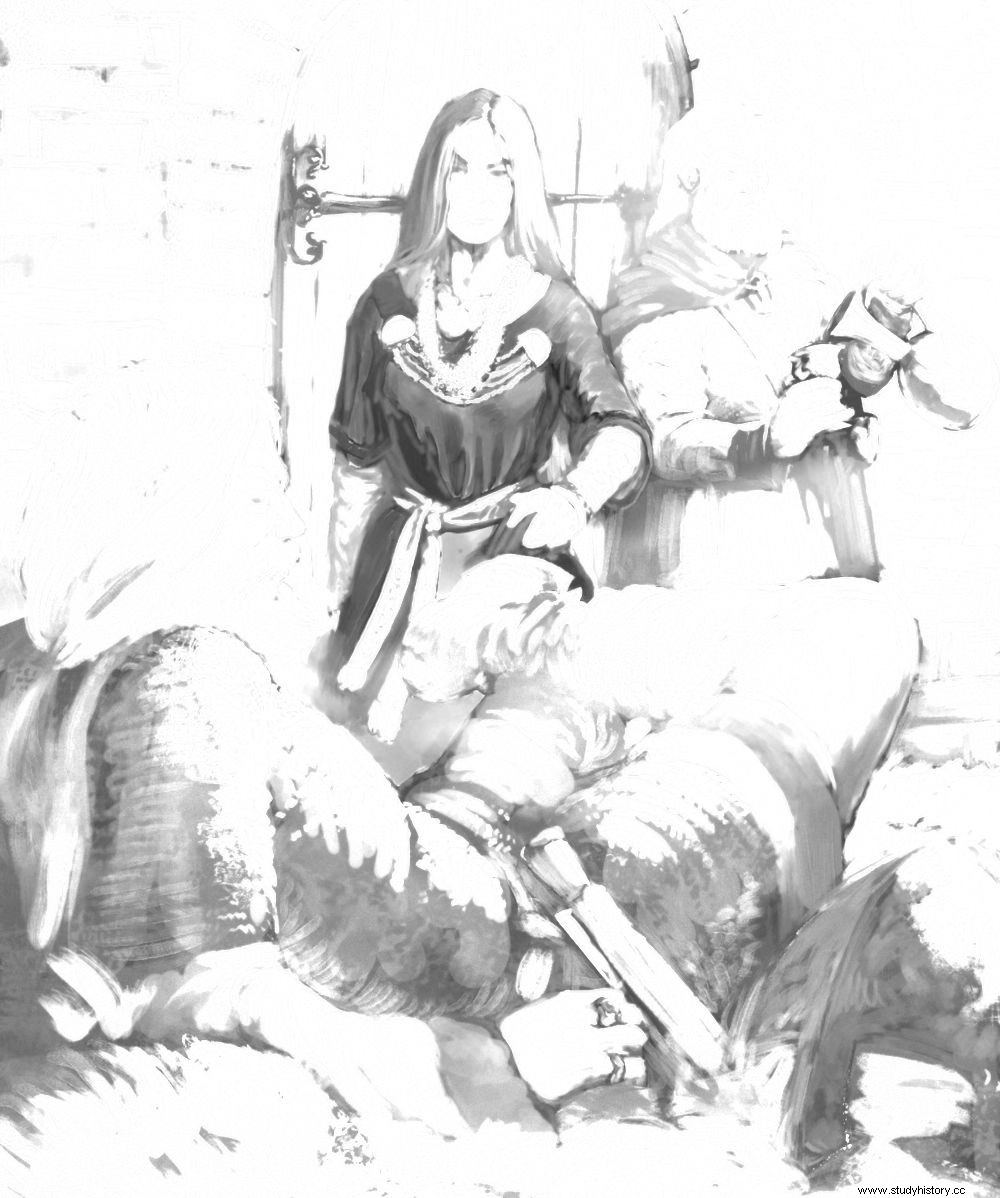
The meeting of Bezprym and Rycheza in the interpretation of Kamil Jadczak (illustration from the book "Ladies with skazą")
Cruel on the throne
The throne was seized by Bezprym. A man who was openly written in German years as having introduced a reign of terror in Poland. The monarchine alone had no chance of defeating him. Even if the thought of leading an armed resistance had come to her mind, she quickly rejected it. The new prince led a ruthless and universal purge. Every day it spread more and more.
If there were officials in Poznań willing to join the monarch, Bezprym had just burned them at the stake. If there were soldiers still faithful to the old order in the garrison of the capital, they were blinded and castrated. The prince did not mince his measures and did not show any weakness.
And apparently, Rycheza realized very quickly that any kind of open fight with him would be doomed to failure. Instead, she used one card that Bezprym was unable to take from her. She played with her origins again.
Bezprym was a hate and a tyrant. But there is no reason to call him crazy. He knew the realities in which he had to rule Poland. And he knew that he would not be able to fulfill certain dreams. He would most willingly force Riches to divorce him, marry her himself, and finally seize his father's inheritance, crowning himself king. Perhaps he was even, in fact, trying to follow these steps.
However, the proud queen quickly threw them out of his head. She made her brother-in-law feel that she came from the most outstanding family of the Reich, that she had powerful relatives, and even Emperor Conrad counted with her. This skilled politician, and at the same time an undisputed specialist in the field of political gestures and rituals, knew what to do to create an aura of superiority and ... inviolability around her.
She was still Bezprym's salt in his eye. She questioned his authority, watched his hands as he got rid of his opponents, and on top of that - she simply exposed his littleness and mediocrity. He would like to get rid of her from Poland. The queen also had nothing to look for in her second homeland. Life has become unbearable here, and her most valuable associates - not counting the few whom she managed to save their lives - either disappeared or were murdered.
There was no post on which she could stand waiting for things to unfold. And no hope that the situation will change quickly. If Rycheza wanted to regain freedom of maneuver and go on any offensive, it could only be done from the territory of Germany. There she had brothers, family fortune, connections of aunts and father. A tactical retreat seemed to be the only reasonable solution. However, it could not have happened on random terms.
Everything for the good of Poland?
The negotiations began immediately. And knowing the further course of events, we can quite accurately determine what was decided during the winter deliberations in the Poznań palace. Richeza agreed to permanently leave the country and even represent Bezprym before the emperor. These favors, however, were to cost the new ruler dearly. The Queen did not renounce her title or even give her brother-in-law the right to dispose of her brother's crown. All the insignia used in 1025 were to travel with her to Germany.
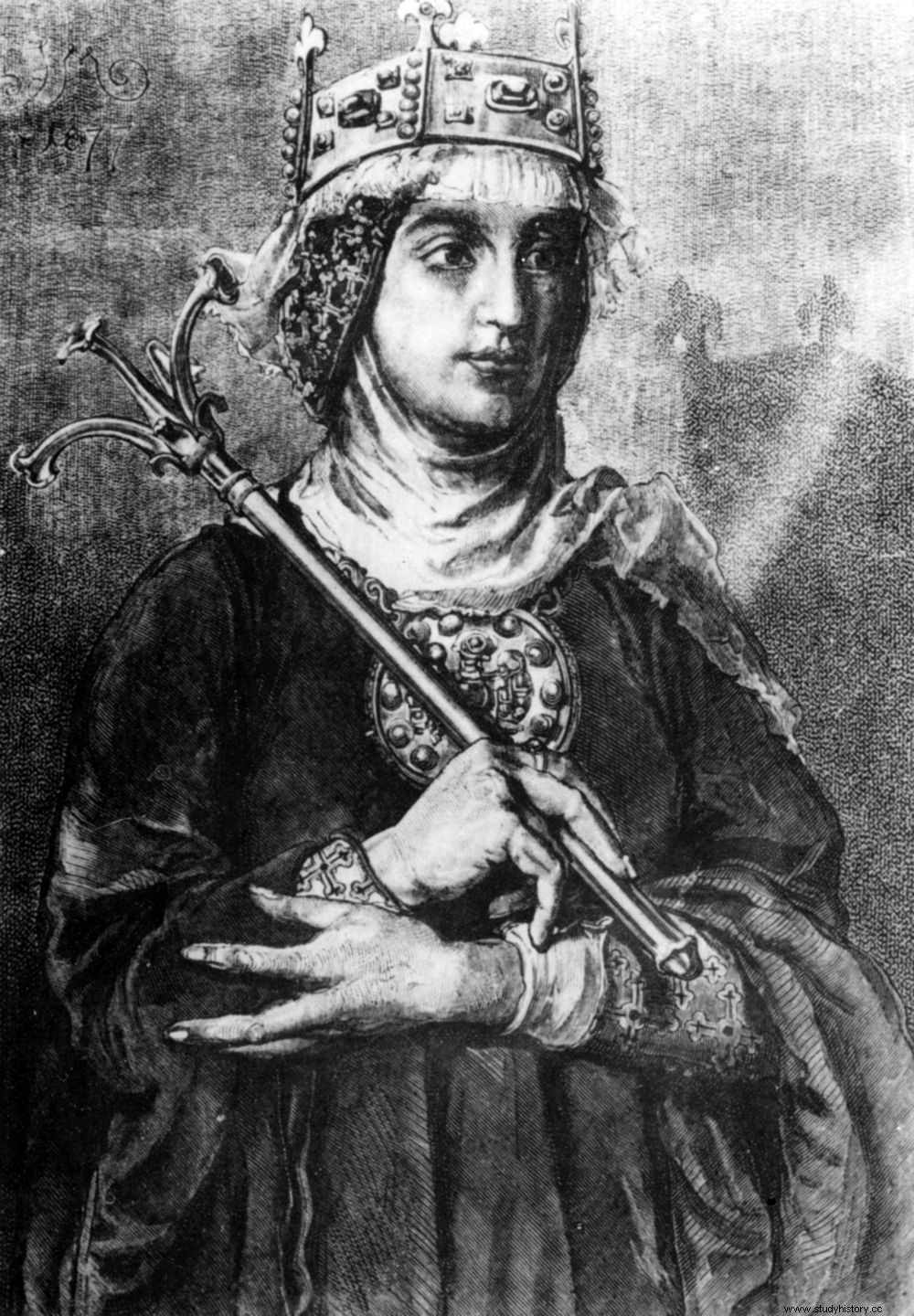
There are many indications that if it were not for Rycheza, today it might not have been Poland at all (source:public domain).
Symbols of power inextricably linked with her person and imperial heritage. Rycheza knew that in the emperor's entourage, great importance was attached to them. And that if she just plays the game right, the crowns can make a difference for her and her son's future.
She was willing to give the insignia to the emperor in order to gain support for herself and for the future prince - Kazimierz. She chose to be humiliated not for her own selfish interest. But because the well-being of the "adopted country" really was at heart. And if it wasn't for her, Poland might not exist today.
Selected bibliography:
The article was based on materials collected by the author during the work on the book "Damy z skazą. The women who crowned Poland " . Some of these items are shown below. Full bibliography in the book.
- D. Borawska, The crisis of the early Piast monarchy in the 1330s , Warsaw 2013.
- M. Delimata, The Queen of Rycheza in the opinion of chroniclers and in Polish historiography [in:] Nihil superfluum esse. Studies from the history of the Middle Ages offered to Professor Jadwiga Krzyżaniakowa , eds. J. Strzelczyk, J. Dobosz, Poznań 2000.
- M. Delimata, The Escape from Poland and the German fate of Queen Rycheza (after 1031–1063) [in:] Docendo discimus. Historical studies offered to Professor Zbigniew Wielgosz on the 70th anniversary of his birth , ed. K. Kaczmarek, J. Nikodem, Poznań 2000.
- S. Halko, Richez von Polen. Gemahlin Mieczyslaws II. , Freiburg 1914.
- G. Labuda, Mieszko II, King of Poland (1025–1034). Breakthrough times in the history of the Polish state , Poznań 2008.
- G. Labuda, Imprisonment of the coronation insignia to Germany in 1031 [in:] Medieval and Old Polish culture. Studies offered to Aleksander Gieysztor in the 50th anniversary of his scientific work , ed. D. Gawinowa, Warsaw 1991.
- A. Pleszczyński, Germany towards the first Piast monarchy (963-1034). The birth of the stereotype , Lublin 2008.
- A. Pospieszyńska, Mieszko II and Germany , "Annals of History", vol. 14 (1938).
- A. Przezdziecki, Traces of Polish Bolesławów in foreign countries . Historical story , Warsaw 1853.
- P. Schreiner, Queen of Rycheza, Poland and Rhineland. Relations between Poles and Germans in the 11th century , Poznań – Cologne 1996.
- B. Śliwiński, Bezprym. Firstborn son of the first king of Poland (986 – winter / spring 1032) , Krakow 2014.
- H. Wolfram, Conrad II, 990–1039. Emperor of Three Kingdoms , University Park 2006.
